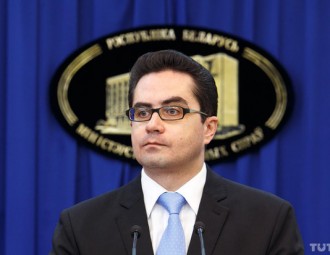Belarus Foreign Ministry called study on modern slavery “a ridiculous document with funny numbers”

Recently the Australian human rights company Walk Free Foundation published a Global Index Slavery report, which estimates that more than 44,000 people in Belarus are living in modern slavery.
According to Spokesperson for the Belarusian Ministry of Foreign Affairs Dmitry Mironchyk, it is a ridiculous document with funny numbers.
“The first question we had was: Have these people ever been to Belarus? And if so, what consumer goods marketplace did they visit to count slaves?” Dmitry Mironchyk asked.
He noted that, according to the report, only a few countries have fewer slaves than Australia. For example, the human rights activists found 900 slaves in Norway and 400 in Iceland. “This accuracy implies that they may have lists with names. We would really want to see those lists!” the spokesman said.
Dmitry Mironchyk said that there is the Special Rapporteur of the UN Human Rights Council who deals with the situation on slavery. “We work very constructively with him. Belarus strictly honors its commitments under the conventions against slavery. Our country has never been criticized regarding their implementation,” Dmitry Mironchyk said, according to BelTA.
The Global Slavery Index provides a map, country by country, of the estimated prevalence of modern slavery, together with information about the steps each government has taken to respond to this issue. This information allows an objective comparison and assessment of both the problem and adequacy of the response in 167 countries, says the official website of the Global Slavery Index. According to it, surveys have been conducted in 25 countries, covering 44 percent of the global population and included over 42,000 respondents. The result of that is a database with over 17,000 datapoints, covering 161 government responses.
The 2016 Global Slavery Index estimates that 45.8 million people are subject to some form of modern slavery in the world today.
The countries with the highest estimated prevalence of modern slavery by the proportion of their population are North Korea, Uzbekistan, Cambodia, India, and Qatar.
Those countries with the highest absolute numbers of people in modern slavery are India, China, Pakistan, Bangladesh, and Uzbekistan. Several of these countries provide the low-cost labour that produces consumer goods for markets in Western Europe, Japan, North America and Australia.
The countries with the lowest estimated prevalence of modern slavery by the proportion of their population are Luxembourg, Ireland, Norway, Denmark, Switzerland, Austria, Sweden and Belgium, the United States and Canada, and Australia and New Zealand. These countries generally have more economic wealth, score higher on government response, have low levels of conflict, and are politically stable with a willingness to combat modern slavery.
-
03.01
-
07.10
-
22.09
-
17.08
-
12.08
-
30.09








































